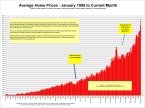 Real Estate observations and predictions by RE/MAX Ontario Atlantic for our local Mississauga, GTA and Canadian Real Estate market for 2006
Real Estate observations and predictions by RE/MAX Ontario Atlantic for our local Mississauga, GTA and Canadian Real Estate market for 2006Specifically, if you are thinking of selling and/or buying a home in the next few months, this article will apply to you.
Affordability to hold steady in 2006 as listing inventory improves in most major markets, says RE/MAX
Mississauga, ON. - After shattering existing records from coast-to-coast in 2005, housing values are expected to moderate in most major centers in 2006. More balanced conditions should emerge in the year ahead, characterized by healthy inventory levels and less urgency in the marketplace, according to a report released today by RE/MAX.
The RE/MAX Housing Market Outlook 2006 found that the vast majority of major Canadian markets surveyed are expecting modest price appreciation ranging from two to five per cent in 2006. The only exceptions are Vancouver, Kelowna, and Calgary, all of which are forecast to experience price increases in the area of 10 per cent next year. Projections for average prices range from a low of zero in London-St. Thomas (Ontario) to a high of 10 per cent in the heated Western Canada markets. Unit sales are forecast to demonstrate solid momentum again in 2006, with all but seven markets (Victoria, Kelowna, Toronto, London-St. Thomas, Kitchener- Waterloo, Montreal and Halifax) expecting activity to either exceed or remain on par with record 2005 levels.
Nationally, home sales are forecast to climb two per cent by year-end 2005 to 472,100 units—the best year ever for housing in Canada. Average price appreciation will post a nine per cent gain, bringing the value of a Canadian home closer to the $250,000 threshold at $246,600. “Canada’s economic engine continues to fire on all cylinders, outperforming expectations at every level,” says Michael Polzler, Executive Vice President and Regional Director, RE/MAX Ontario-Atlantic Canada. “Consumer confidence levels are strong.
Even the Bank of Canada’s effort to put the brakes on the economy – boosting interest rates one half of one percentage point in a two-month period -- only served to bolster home-buying activity. Interest rates could climb as much as two percentage points before we see any real impact on the housing market.”
Strong economic fundamentals will contribute to healthy residential real estate activity yet again in 2006. Western Canada, Newfoundland, New Brunswick and Nova Scotia, in particular, are expected to benefit from thriving oil and gas-related industries. Nationwide, billions of dollars have been earmarked for non-residential construction. Immigration is also forecast to play a greater role in housing markets across the country. Canada is opening its door to as many as 255,000 new immigrants in 2006 and that figure may be ramped up in the future. Typically, household formation among new immigrants takes place within five years of arrival.
The highest percentage increases in unit sales are expected to occur in Western Canadian markets next year. Edmonton and Regina are predicted to lead the country with a five per cent increase over 2005 levels. Sixty-one per cent of all markets forecast activity in 2006 to be on par the previous year’s figures.
“Affordability has certainly been a major concern, particularly in markets in British Columbia and Alberta, where average price has experienced strong upward momentum throughout 2005 due to tight inventory levels,” says Elton Ash, Regional Executive Vice President, RE/MAX of Western Canada. “An influx of new listings in the marketplace should ease some of the upward pressure on housing values and allow purchasers the luxury of time when buying a home.” Highlights:
First-time buyers are expected to play an integral role in housing markets from coast to coast.
Move-up purchasers will continue to take advantage of equity gains in recent years to trade-up to bigger and better properties.
The upper-end of the market is predicted to post impressive gains in several major markets.
Singles, baby boomers, and retirees are forecast to fuel demand for the increasingly coveted condominium lifestyle.
Adult communities are growing in popularity with empty nesters and retirees.
RE/MAX is Canada’s leading real estate organization with over 15,500 sales associates situated throughout its more than 605 independently owned and operated offices across the country. The RE/MAX franchise network, now in its 32nd year of consecutive growth, is a global real estate system operating in over 58 countries. More than 5,800 independently owned offices engage 113,000 member sales associates who lead the industry in professional designations, experience and production while providing real estate services in residential, commercial, referral, relocation and asset management. For more information visit: www.remax.ca
I help clients with many of their rentals per year and I am finding it much more difficult to find good quality tenants over the past few years. You may read the latest TREB (Toronto Real Estate Board) rental property report in pdf format.
Even if we have a correction in our market, I don't think it will be too significant. We are not in a boom similar to the investor fueled boom of the mid to late 80's so I think (and hope) that we will not ever see the bottom fall out of the market the way we did in '89 to '95.
So there you have it from RE/MAX and a few other sources. I am sorry I cannot predict the market more accurately for you. When push comes to shove, you will have to make the final decision.
Many in GTA are house hunting - cmhc-schl.gc.ca - More than 220,000 households in the Greater Toronto Area, or GTA, are thinking of buying a home this year, according to a survey by Canada Mortgage and Housing Corp., or CMHC CMHC's survey, conducted this past fall, indicates Toronto's housing market will remain hot this year. The survey found 13 per cent of the GTA's 1.7 million households plan to take the home-buying plunge this year. Toronto Star article
Toronto Housing Market Outlook for 2005 courtesy of CMHC - pdf document
Conclusion that I draw from this and other sources
It is interesting that many of the experts are predicting prices to rise only slightly for 2006, but nearly as not as much as they did in 2005. I would agree with this line of thinking. The last 4 months of 2005 showed signs of a more "normal" market. The market so far in 2006, up to the end of February has been normal, but nowhere near the sales volume or price increases that were experienced in early spring of 2005.
As long as rates stay about where they are we should see another year with a healthy real estate market for 2006 with modest price increases.
So, if you are thinking of selling and buying a homes this year, should you buy or sell first? I've had many clients purchase before they sell. I just want you to have all the information so you can make the best decision for yourself and your family. You may read more about buying or selling first here
Read about what happened in real estate last month.
I wish you much success, good health and happiness in 2006 and always!
Past Issues of TREB Market Watch for Toronto Real Estate
If you would like to discuss issues like this or other questions you may have, please email me at anytime .
Mark
















